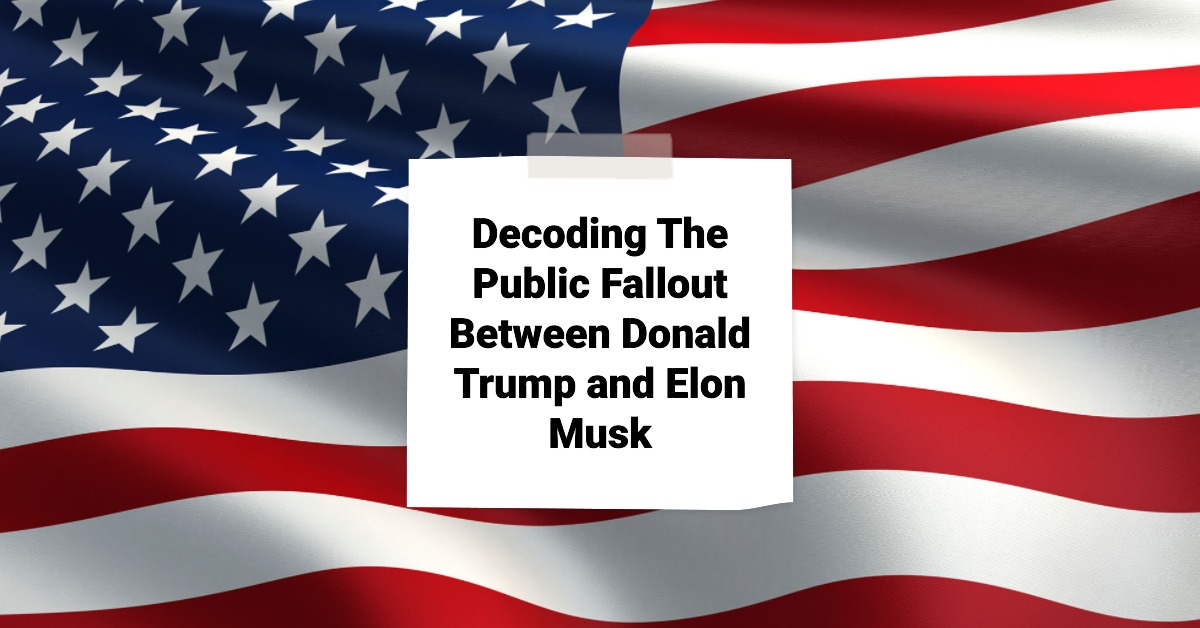Imagine two massive ships sailing in the same stormy sea. For a while, they seemed to be moving together, maybe even benefiting from each other's presence. Then, out of nowhere, they collide head-on. That's kind of what it felt like watching the very public clash between former President Donald Trump and tech heavyweight Elon Musk.
Decoding The Public Fallout Between Donald Trump and Elon Musk
The Fallout Between Trump and Elon Musk: Predictions Came True? From where I'm sitting, and watching this bizarre political drama unfold, the answer seems a definite yes, the predictions about their eventual split largely came true. What started as a surprising, perhaps even opportunistic, alignment between two of the world's biggest personalities has crumbled in a very public, very messy way, just as many observers expected.
A Surprise Pairing That Raised Eyebrows
Let's rewind a bit. The idea of Donald Trump and Elon Musk getting along seemed strange to me from the start. Trump, the real estate mogul turned populist politician, known for his rallies, his tweets (before he got banned), and his focus on traditional industries and trade. Musk, the visionary tech entrepreneur behind electric cars (Tesla) and rockets (SpaceX), often talking about saving humanity and colonizing Mars. They seemed like they were from different planets, frankly.
But they found common ground, especially during Trump's presidency. Musk participated in some of Trump's business advisory councils, though he later left one over the Paris Agreement withdrawal. There was a period where it seemed like maybe, just maybe, this unlikely pairing could work, built perhaps on shared interests in infrastructure, American manufacturing (even high-tech manufacturing), or just a mutual appreciation for being disruptors and dominating headlines.
I remember thinking at the time, “How long can this last?” Their personalities are both so dominant, so used to being the center of attention, and crucially, so used to getting their own way. So, when the cracks started showing, first subtly and then in giant, gaping chasms, it didn't really shock me.
The Seeds of Discord Planted: A Taxing Issue
Where did it all really start going south? A key turning point was around Trump's big tax cut and spending bill. This was a massive piece of legislation, proposing trillions in tax cuts and significant spending adjustments.
Elon Musk, who isn't shy about sharing his opinions on pretty much everything, looked at the numbers and didn't hold back. He reportedly called the bill “fiscally reckless” and a “disgusting abomination” according to reports at the time. Now, calling a sitting President's signature economic plan a “disgusting abomination” is not exactly a gentle critique.
It's a full-frontal assault. Musk didn't just stop at words; he reportedly threatened to put his considerable wealth towards opposing Republican lawmakers who supported the bill. That's a direct political threat, challenging the President's agenda and his party.
From my perspective, this was the match that lit the fuse. Trump, as we've all seen, does not take criticism lightly, especially not from someone he might have seen as an ally or someone who benefited from the system he presided over. His response felt swift and, importantly, personal. Reports indicated Trump withdrew the nomination of Jared Isaacman, a known Musk associate, for a high-level NASA position.
This move wasn't about policy; it was about signaling displeasure and hitting Musk indirectly through someone he cared about or worked with. It was a power play, a clear message: “You criticize me? I'll make things difficult for your people.” This kind of tit-for-tat is classic for both men, in my opinion, and a sign their brief detente was over.
Turning Up the Heat: From Policy Squabbles to Personal Attacks
Once the public argument started, it escalated fast, like throwing gasoline on a bonfire. Both Trump and Musk are masters of using public platforms – social media chief among them – to wage their battles.
Musk took things another step, reportedly endorsing a social media post that called for Trump's impeachment. Think about that for a second. A major billionaire and tech figure, who had previously been seen somewhat favorably by the administration, publicly backing impeachment calls. That's not a policy disagreement anymore; that's a direct challenge to Trump's legitimacy and power. He also reportedly brought up delays in the release of Epstein-related documents, hinting at political maneuvering. These weren't minor jabs; they were aimed right at sensitive political spots for Trump.
Trump's hits back were equally direct and potentially damaging to Musk's business empire. Using his platform, Truth Social, Trump reportedly expressed disappointment in Musk and, more significantly, floated the idea of cutting off government subsidies and contracts for Musk's companies like Tesla and SpaceX. Now, this hits Musk where it really hurts – his wallet and the operational success of his ventures, particularly SpaceX, which relies heavily on government contracts (hello, NASA, military, etc.). This wasn't just tough talk; it was a threat with potentially billions of dollars on the line.
And it wasn't just Trump. His allies, like Steve Bannon, reportedly piled on, suggesting investigations not just into Musk's businesses but into Musk himself – his immigration status, security clearance, rumored drug use, and his ties to countries like China. This level of personal attack and threat of official scrutiny shows just how deeply personal and politically charged this fallout became. It felt, to me, like the gloves were completely off on both sides.
When Billions Are on the Line: The Financial Earthquake
The public shouting match wasn't just noise; it had real-world consequences, especially for Musk's business empire. The most attention-grabbing impact was on Tesla. The data indicates that on the day the fallout became very public and heated, Tesla's stock price dropped significantly, reportedly by 14%. That might sound like just a number, but for a company as valuable as Tesla, a 14% drop translates into a staggering loss of over $150 billion in market value. Poof. Gone in a day, partly because of a political quarrel.
| Impact Area | Details |
|---|---|
| Tesla Stock Price | Dropped 14%, erasing over $150 billion in market value in a single day. |
| Government Contracts | Potential loss of federal subsidies and contracts for Tesla and SpaceX. |
| Public Perception | Musk's approval ratings reportedly fell significantly, labeled “political kryptonite.” |
This immediate financial hit highlights a major risk for Musk: his public persona and political entanglements are so closely tied to his companies that political drama can directly impact their value.
Beyond Tesla's stock, the threat of losing government contracts for SpaceX and potentially future projects like xAI looms large. SpaceX isn't just sending cool rockets to space; it's providing satellite internet (Starlink), launching government payloads, and working on critical national security projects. Losing those contracts under a future administration hostile to Musk would be a serious blow. I think this is one of the key vulnerabilities Trump was targeting with his threats – hitting Musk's most critical, government-dependent ventures.
Musk's public perception also took a hit. Social media, as indicated by the data, showed a decline in his approval. Labels like “political kryptonite” started appearing. His reported favorability numbers dropped notably, especially among Democrats. This shift matters because Musk relies on public and political goodwill for things like regulatory approvals, infrastructure support for Tesla, and continued government partnership for SpaceX.
Becoming a highly polarizing figure, particularly if his political battles alienate key decision-makers, could complicate his ambitious plans. Personally, I saw this shift happening online. People who might have admired him purely as an innovator seemed turned off by the political mess.
Shaking Up the Political Arena
This feud isn't just about two rich and powerful guys arguing; it has real implications for politics, especially with major elections on the horizon.
Musk's reported threat to fund campaigns against certain Republican lawmakers who backed Trump's tax bill creates uncertainty within the GOP. Will his money and influence be used to challenge incumbents? Could it impact key races for the House or Senate? The data suggests this possibility, and from my vantage point watching political strategy, even the threat of a wealthy figure targeting specific politicians can make waves and force people to reconsider their positions or allegiances.
On the flip side, some Democrats reportedly see this fallout as a positive development, even calling it “Christmas” for their party. A public fight between Trump and a figure associated with (though complicated) technology and innovation could potentially alienate some voters from Trump's side or simply distract from Democratic challenges.
Musk's financial role in politics is complex. He reportedly spent a significant amount, nearly $300 million, supporting Trump's campaign and other Republicans in 2024. However, reports stated he would not contribute an additional $100 million he had previously pledged. This withdrawal of a substantial pledge is noteworthy.
It weakens Trump's fundraising efforts, especially in tapping into the tech donor base, and signals that Musk is not going to write a blank check after this public spat. It suggests to me that Musk's political spending can be transactional and tied to perceived benefit or alignment, and when that alignment breaks, so does the financial support.
The Water Cooler Talk: Public and Cultural Reactions
This whole drama naturally spilled over into the public consciousness and captured a lot of attention. Social media platforms, particularly X (which Musk owns, adding another layer), buzzed with reactions. People were watching, memeing, and debating the “bromance gone wrong,” as some in the entertainment world reportedly dubbed it.
What does this public spectacle tell us? It reinforces how intertwined politics, big business, and celebrity have become. The actions and words of figures like Trump and Musk don't happen in a vacuum; they are dissected, celebrated, or condemned by millions online.
It also serves as a cautionary tale, in my opinion, about the risks involved when powerful personalities with huge egos and differing agendas try to form alliances, especially when those alliances feel based more on expediency than shared core beliefs. The public loves a good drama, and this one had all the elements: power, money, ego, and public feuding.
Were the Predictions Accurate? Looking Back at the Warning Signs
This brings us back to the core question of this article: The Fallout Between Trump and Elon Musk: Predictions Came True? Absolutely, yes, they did. Many people watching these two interact from the start had their doubts about how long any partnership could last. Why?
- Clashing Personalities: Both men are known for their strong, often stubborn, personalities. They are used to being the boss, making the final decisions, and demanding loyalty or at least compliance. It's hard to imagine either one comfortably playing second fiddle or backing down easily in a disagreement. Friction felt inevitable.
- Divergent Goals and Ideologies (Sometimes): While they might find common ground on certain things (like cutting regulations or perhaps certain infrastructure investments), their core drives seem different. Trump's focus has been primarily inward-looking nationalism and traditional conservative policy (mixed with populism). Musk's stated goals are often grand, futuristic, and global (clean energy, space travel, AI safety – though his political views seem to have shifted over time). This fundamental difference in focus was always a potential wedge.
- Transactional vs. Loyal: Trump often operates on a transactional basis – what can you do for me, what loyalty will you show me? Musk, while perhaps also transactional in business, is also known for being unpredictable and ideologically flexible, shifting alliances and opinions publicly. A figure like Musk, who won't toe a consistent party line or refrain from public criticism, was always going to be a challenge for someone like Trump who expects unwavering support from allies.
- Early Friction: Even when things seemed okay, there were reports of friction. Musk left the advisory council. The data points to early reports of the White House trying to limit Musk's influence on staffing and budget decisions. These were early warning signs that the relationship wasn't smooth behind the scenes, culminating in the public blow-up we saw.
Looking back, the signs were all there. The alliance felt less like a meeting of minds and more like a temporary overlap of interests. The public nature of both men, their reliance on direct communication (often unfiltered), and their history of taking public disagreements personally meant that any serious conflict was likely to spiral out of control and become very visible. Having followed both men's careers for years, their eventual collision felt less like a surprise and more like an inevitability based on their fundamental makeup and operating styles.
What's Next? A Call and Continued Uncertainty
Despite the very public and acrimonious split, there's a report that Trump and Musk are scheduled to speak. The outcome is anyone's guess, and I'll be watching to see if anything comes of it.
Some political watchers, like Rep. Richard Hudson mentioned in the data, reportedly believe the feud might eventually “blow over,” perhaps based on shared policy interests still existing, like infrastructure or economic growth. They might see a pragmatic need for reconciliation or at least a truce.
However, others, myself included, are more skeptical. The damage feels substantial and very public. Too many harsh words were said, too many personal attacks were launched, and too many threats were made (especially the business-related ones). Can you fully come back from one side suggesting cutting off your government contracts while the other endorsed impeaching you just a little while ago? It seems difficult.
For Trump, losing a figure like Musk is a blow. It means losing a potential powerful ally and a source of significant funding, which could matter in future political endeavors, especially among tech-savvy voters or parts of the business community.
For Musk, this political involvement and the subsequent fallout highlight the risks. It's impacted his companies' market value and his public image. He has to navigate the consequences of wading so deeply into the divisive waters of American politics.
The broader implications for the tech industry's relationship with government and the future of political fundraising are still unfolding. This specific spat between Trump and Musk is a high-profile example of the complex and often volatile intersection of these worlds.
Wrapping It All Up
The public fallout between Donald Trump and Elon Musk is, without a doubt, a memorable chapter in the ongoing story of how big business and politics collide. It started as a seemingly unlikely alliance, built perhaps on mutual benefit or disruption, but it ultimately collapsed under the weight of clashing personalities, policy disagreements, and a willingness from both sides to take things very, very public.
The predictions made early on, the ones that suggested this partnership was inherently unstable due to who these men are, have certainly come true. The consequences have been real and immediate, hitting Tesla's stock value, creating political ripple effects, and shifting public perception.
Whether the reported scheduled phone call leads to any thawing of the relationship remains to be seen. But regardless of what happens next, this very public spat serves as a powerful reminder of the challenges and potential dangers when two incredibly powerful, ego-driven figures with fundamentally different styles and goals try to share the stage. It was a dramatic split that many saw coming, and the repercussions will likely continue to be felt for some time.
Focus on Real Wealth—Not Drama
While headlines swirl about public figures like Trump and Musk, real opportunities are emerging quietly in stable, cash-flowing real estate markets.
Let Norada help you avoid media noise and instead build long-term wealth with turnkey investment properties that deliver passive income and appreciation.
HOT NEW LISTINGS JUST ADDED!
Talk to a Norada investment counselor today (No Obligation):
(800) 611-3060
Read More:
- What is Trump's Plan for Privatizing Fannie Mae and Freddie Mac?
- Elon Musk's $10,000 Homes: A Game Changer for the Housing Market?
- Elon Musk Calls for Major Reforms at the U.S. Federal Reserve
- Can Elon Musk Revolutionize Affordable Housing for Americans?
- Emergency Price Relief on Housing: What Does Trump's Order Mean?
- Trump's Inaugural Speech: Bold Plans on Border, Economy, and More
- What Happens to Kamala Harris' Proposal of $25,000 Homebuyer Assistance Now?
- Housing Market Predictions for 2025 if “Trump” Wins Election
- 10 Housing Market Predictions Under Trump for the Next 4 Years
- Will Donald Trump's Victory Reshape the Housing Market in 2025?
- Trump vs Harris: Housing Market Predictions Post-Election
- 10 Housing Market Predictions Under Trump for the Next 4 Years
- Will Donald Trump's Victory Reshape the Housing Market in 2025?




